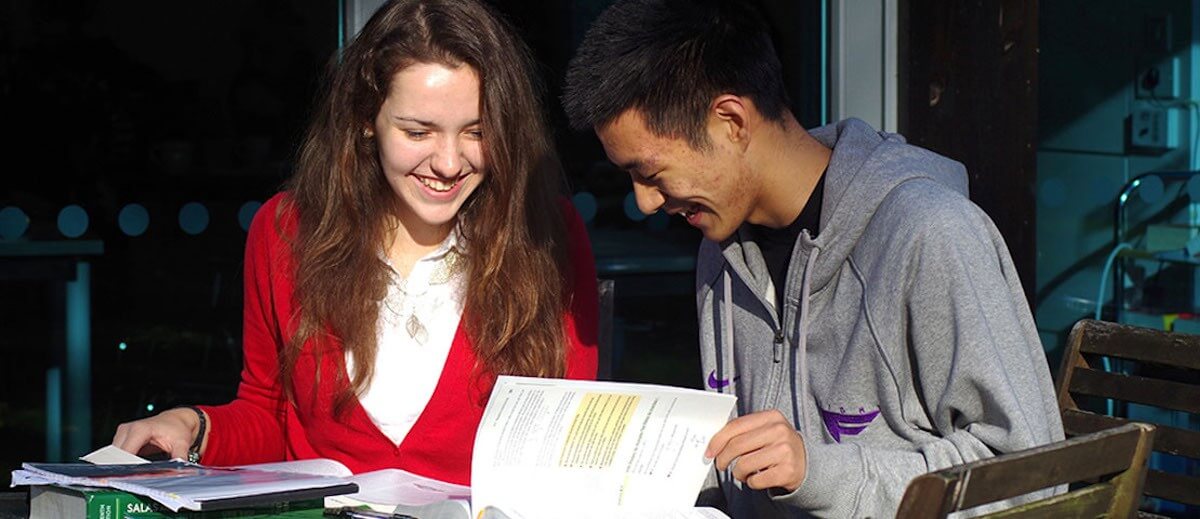In his 19 years of life, Swiss-born Georgy has changed educational institutions eight times.
These changes were sudden and disorienting, but the upside was he was exposed to many different cultures and educational settings from a young age.
So when he says that his time spent in Scotland with the University of St Andrews and their International Education Institute has been his most rewarding educational experience so far, you know it’s an opinion worth something:
“I’ve never been taught by such responsive, compassionate and open-minded staff as in St Andrews.”
It’s a truly different approach from every other place he has been to.
“Instead of simply giving solutions, the tutors will always point you in the right direction so that you can find the answers yourself,” he said.
“This is what learning is all about.”
A world-leading university in a Scottish seaside town
For Georgy, there were a few factors that led him to study at the University of St Andrews.
The first was the “quality of renowned British education,” which he had always wanted to experience at a university level.
The University is ranked second best in the UK by The Guardian University Guide 2020 and third best by The Complete University Guide 2020 — with these two achievements, Georgy believes it to be “common sense” for him to choose St Andrews.

Source: University of St Andrews
The second reason he chose the University was because of its International Foundation Programme (IFP), which are the University’s own programmes.
Georgy knew that an IFP would combine academic subjects with English language development sessions to help prepare him for university-level studies.
After reviewing the suite of IFP programmes offered here: Business – Management, Economics and Finance, Medicine (Foundation), Medicine (International Pathway), Science and Social Sciences and Humanities, Georgy chose to study Science, but with a core focus on Computer Science.
“What I adore about studying computer science at St Andrews is that I feel that I’m treated just as any other first year student,” he said.
“IFP Science students are also allowed to progress to the second year of their studies on condition of having decent grades.”
To ensure that his grades meet the mark, Georgy refines his computer science knowledge through practice and lab demonstration sessions run by the University’s PhD students.
He has also benefited from the academic writing classes at the International Educational Institute:
“Academic language, that includes referencing, is the only way of non-verbal communication at university,” he explained.
“It remains one of the crucial skills that a student needs to succeed in their academic endeavours. And through this class and many more, my IFP lecturers have done a brilliant job at preparing me for the upcoming challenges of student life.”
An international study hub that stands out from the rest
For Management, Economics and Finance IFP student Emily Zhong, it was the University’s unique cultural heritage and student traditions that led her to study in Scotland.
“St Andrews is Scotland’s oldest university with more than 600 years’ worth of history and traditional activities, for instance Raisin Monday and academic families,” said the student from China.

Emily Zhong. Source: University of St. Andrews
“The University’s main library is also very famous but there are also libraries in places like the Physics building that have an abundance of resources and give us a convenient way to collect materials. There is also an online library to help facilitate our studies,” she added.
During her IFP, Emily found the tutors to be constant resources of support, especially when she felt far away from home:
“When we first arrived, there are many things that we do not adapt to straight away because it is the first time for most of us to be studying abroad on our own,” she explained.
“Therefore, our tutor regularly schedules personal tutorials for us so they can answer our study doubts and care about our life, our mental health and help us adapt to a new life abroad and a new education system.”
IFP Medicine student Alexandra Frances Alexander from Malaysia also found comfort in the IE staff’s guidance.
“Coming straight from a GCSE level, there were a lot of things that I had not learned about. The IFP programme helped me to develop what I didn’t know whilst getting the support I needed along the way,” she said.
“For instance, it helped improve my writing skills in terms of research and referencing in essays. And as I hadn’t come across this practice before, the tutors guided me through and provided plenty of worksheets to make sure I got it right.”
Like many IFP students, Alexandra also used her practical skills outside the classroom.
For example, she visited the School of Medicine several times to carry out patient consultations with actual patients, and she enjoyed a weekend study retreat to a country house with beautiful surroundings (The Burn) where she had practice sessions for her multiple mini interviews (MMI).
Want to experience practical learning experiences like these in Scotland and spotted an IFP programme that matches your aspirations? Start your study journey today with an International Education Institute that many students know, love and trust.
Update from June 2020:
New for September 2020 entry, St Andrews is offering an all-online integrated programme which features a mix of Year 1 content and pre-degree study skills. Designed to give you certainty in uncertain times, the Global Online Year One (GOYO) allows to study from home but will ensure you are thoroughly prepared for degree study in the UK. Successful students can achieve a Certificate in Higher Education or progress onto Year 2 of a degree on campus in St Andrews in September 2021.
Follow the University of St Andrews on Facebook, Twitter, Instagram and YouTube
Liked this? Then you’ll love…
A day in the life of a Loughborough College IFP student
The benefits of UK-based International Foundation Programmes (IFP)










